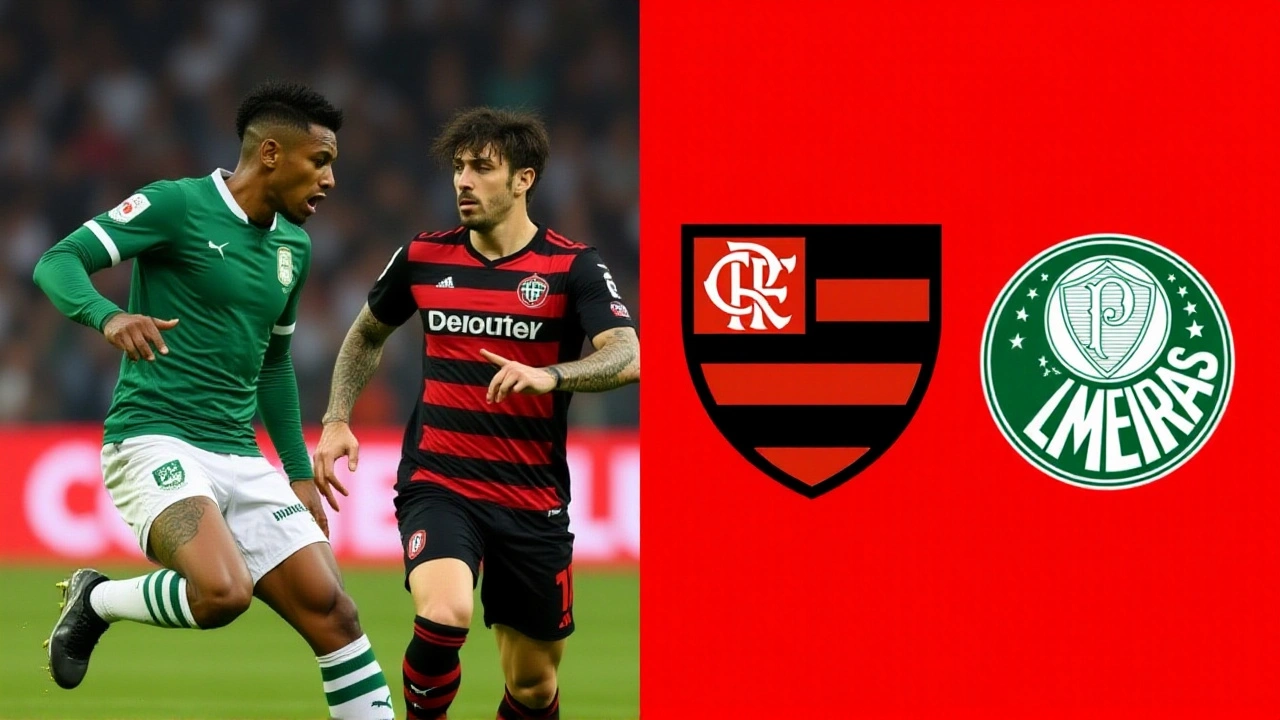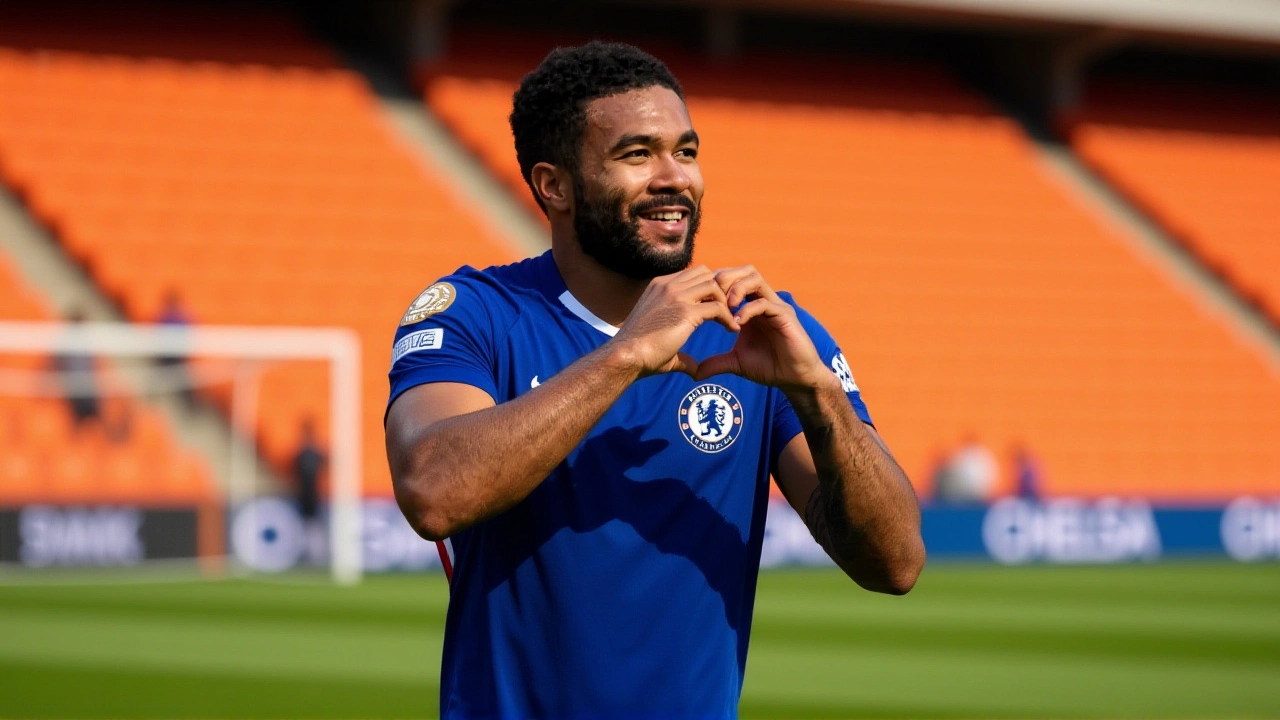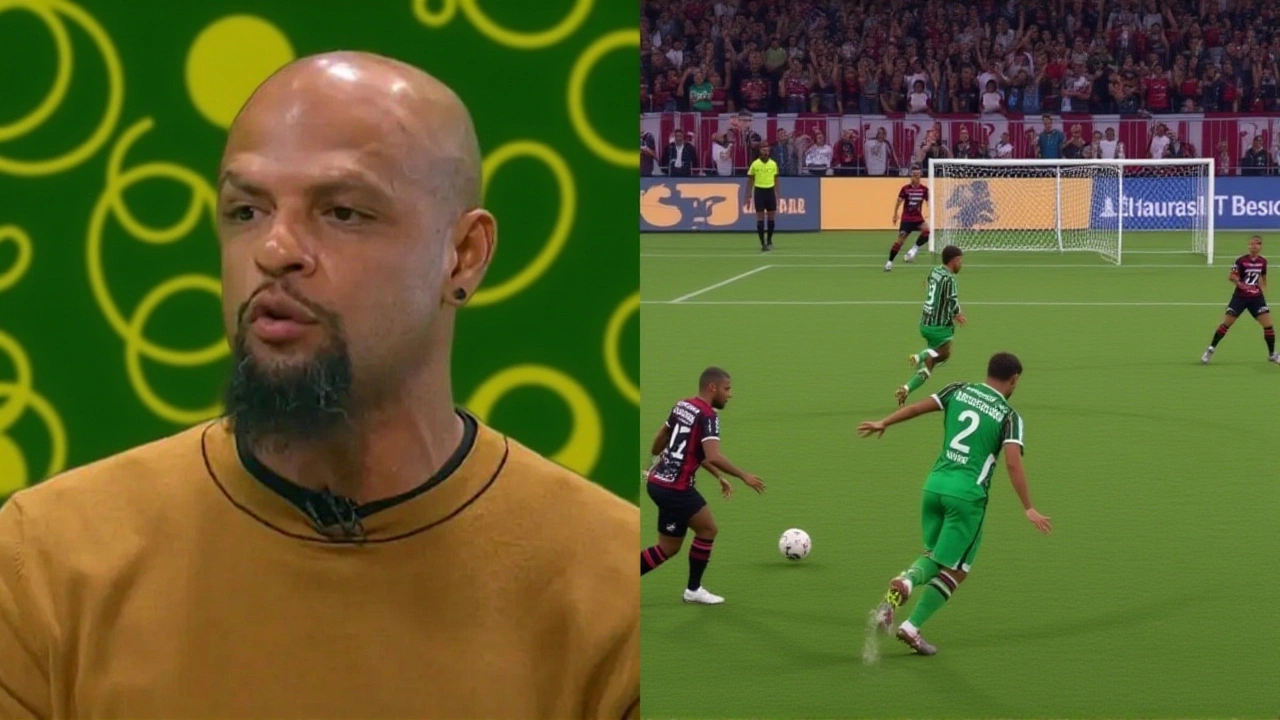Palmeiras fans erupt after STJD fines Flamengo's Bruno Henrique instead of suspending him
 Nov, 23 2025
Nov, 23 2025
When the Superior Tribunal de Justiça Desportiva (STJD) dropped its punishment of Flamengo striker Bruno Henrique from a 12-game suspension to a mere R$100,000 fine on the November 13, 2023 judgment, the reaction wasn’t just loud—it was seismic. Torcedores from Sociedade Esportiva Palmeiras flooded social media with rage, not because of the decision itself, but because of what it revealed: a system that seems to bend differently depending on which club you play for. And here’s the twist: the man who voted to free Bruno Henrique, Rodrigo Aiache, vice-president of the STJD, was spotted wearing a Flamengo jersey on his personal Instagram. The photo didn’t just go viral—it ignited a firestorm.
Why This Feels Like a Betrayal
For Palmeiras fans, this wasn’t just about one player. It was about consistency. Or the lack of it. Just weeks before, Allan Vieira da Silva, a Palmeiras forward, received a two-game suspension for a routine red card. No controversy. No appeals. Just a standard penalty. Meanwhile, Vitor Roque, another Palmeiras star, remains under investigation for a deleted social media post interpreted as homophobic—a potential multi-game ban that could derail his season. Yet Bruno Henrique, accused of supplying inside information to sports bettors—a violation that could undermine the integrity of the entire league—walks away with a fine smaller than the cost of a season ticket package."It’s not about Bruno," said one Palmeiras supporter on X, formerly Twitter. "It’s about the guy who voted for him wearing the enemy’s shirt. That’s not bias. That’s a conflict of interest with a flag on it."
The STJD’s Image Problem
The Superior Tribunal de Justiça Desportiva, based in Rio de Janeiro, is supposed to be Brazil’s final word on disciplinary matters in football. But this ruling has shattered its credibility. The tribunal initially charged Bruno Henrique under Article 112—"interfering with match results and harming the team." That’s serious. It carries mandatory suspensions. But during the November 13 hearing, his legal team successfully reclassified the charge under Article 124—"breach of competition regulations." Suddenly, it became a paperwork error, not a corruption risk. The shift was abrupt. The reasoning? Unclear.Jornalista Danilo Lavieri of UOL confirmed what many suspected: Palmeiras officials were furious after seeing Aiache’s Flamengo shirt photo. "They were already tense after the postponement on November 10," Lavieri said. "Then they saw the shirt. And the vote. It felt like a joke."
The Silence of the President
Leila Pereira, president of Palmeiras, had voiced concern after the hearing was delayed on November 10. She called for transparency. But after the verdict? Nothing. No press release. No statement. Not even a tweet. The silence speaks louder than any apology could. Sources inside the club say internal meetings were heated. One executive reportedly said, "We don’t need to say anything. The world will see what’s happening."Meanwhile, Flamengo celebrated. Their official channels posted a simple message: "Justice served." But for Palmeiras fans, justice is the last thing on their minds. It’s fairness. And right now, it feels like it’s sold to the highest bidder—or the most loyal fan.

What’s Next? The Roque Case Looms
The STJD hasn’t finished its work. The case of Vitor Roque is still pending. And if the tribunal hands down a harsh penalty—say, a three-game ban—for a post that was deleted within minutes, while letting Bruno Henrique off with a fine for a far more serious allegation, the backlash won’t just be online. It could spill into the stands. Palmeiras’ next home game against a top rival could turn into a protest. Signs are already being printed. Chants are being rehearsed."If they punish Vitor and let Bruno walk," said a Palmeiras fan group organizer, "we’ll bring the STJD’s entire credibility to the stadium. And we’ll bring cameras."
A System in Need of Reform
This isn’t the first time the STJD has been accused of inconsistency. In 2021, a Flamengo player received a 10-game ban for spitting at an opponent. In 2022, a Palmeiras player got just two games for the same offense. In 2020, a Corinthians player was suspended for social media comments, while a São Paulo FC player made nearly identical posts and got a warning. The pattern is clear: power, influence, and club loyalty seem to weigh more than rules.The Brazilian Football Confederation (CBF) has remained quiet. But pressure is mounting. Former referees, legal scholars, and even ex-STJD members are now calling for an independent audit. The STJD’s 15-member panel is appointed by the CBF and the Brazilian Football League. No transparency. No public voting records. No conflict-of-interest disclosures. In a country where football is religion, that’s not just a flaw—it’s a crisis.

What Fans Are Demanding
Palmeiras supporters aren’t just angry. They’re organizing. Online petitions have surpassed 200,000 signatures. A hashtag, #JusticaNoSTJD, is trending nationwide. Some are demanding the resignation of Rodrigo Aiache. Others want all STJD votes made public. A few are even calling for the tribunal to be dissolved and replaced with a civilian-led body."We’re not asking for special treatment," said one fan at a São Paulo protest on November 17. "We’re asking for the same treatment. That’s not too much to ask for a game we love."
Frequently Asked Questions
Why did Bruno Henrique get a fine instead of a suspension?
His legal team successfully reclassified his charge from Article 112 (interfering with match results) to Article 124 (breach of competition regulations), which carries only fines under STJD guidelines. The change wasn’t explained publicly, and no evidence was presented to support the reclassification. Critics argue the shift was procedural manipulation to avoid mandatory suspensions.
How did Rodrigo Aiache’s Flamengo shirt affect the case?
The photo, posted publicly on his personal Instagram, showed Aiache wearing a Flamengo jersey during the week of the trial. While not illegal, it raised serious questions about impartiality, especially since he voted in favor of Flamengo’s position. Palmeiras officials called it a conflict of interest, and the image became central to accusations of bias in the tribunal’s decision-making.
Why is Palmeiras staying silent while fans protest?
Palmeiras’ leadership, including president Leila Pereira, has chosen institutional silence to avoid escalating tensions or risking further sanctions from the STJD. However, insiders confirm frustration runs high internally. The club is reportedly gathering legal and media evidence to challenge future rulings, but has not yet filed an official appeal.
What could happen to Vitor Roque, and how is his case connected?
Vitor Roque is under investigation for a deleted social media post interpreted as homophobic. Unlike Bruno Henrique’s case, there’s no evidence of external influence—just a quick deletion and public apology. But if the STJD imposes a multi-game ban on Roque while letting Henrique off with a fine, fans fear a clear double standard. The outcome could trigger legal challenges or mass protests at Palmeiras’ next match.
Has the STJD ever been restructured after past controversies?
Yes. After the 2013 "Operação Cadeia" scandal, where judges were caught taking bribes, the STJD was reformed with new appointment rules. But those reforms didn’t include transparency measures like public voting records or mandatory conflict-of-interest disclosures. Today’s critics say the system was patched, not fixed—and this case proves it.
What’s the broader impact on Brazilian football?
Trust in the integrity of Brazilian football is eroding. Sponsors are asking questions. Broadcasters are reviewing contracts. Young players are beginning to question whether fair play matters. If fans believe results are manipulated behind closed doors, the emotional and economic value of the sport itself is at risk. This isn’t just about Palmeiras or Flamengo—it’s about whether the game still means anything.

Vaneet Goyal
November 25, 2025 AT 10:39Let me be clear: this isn’t about football. It’s about power. The STJD is a joke with a robe. They don’t enforce rules-they enforce loyalty. And if you’re not wearing the right jersey, you get punished like a common criminal. The fact that Aiache wore a Flamengo shirt and then voted to let Bruno Henrique off? That’s not bias. That’s a public confession.
Ambika Dhal
November 27, 2025 AT 07:27It’s not even about the fine. It’s about the silence. Palmeiras didn’t scream. They didn’t beg. They just… stopped talking. And that’s scarier than any protest. Because when a club realizes the system is rigged beyond repair, they don’t fight. They just wait for the next injustice to come. And they let it burn.
Amita Sinha
November 28, 2025 AT 21:44BRUH. I just saw the photo of Aiache in that Flamengo jersey and I cried. Not because I’m emotional-I’m just tired. Tired of watching rich men in suits play god with our passion. We’re not fans. We’re collateral damage in a game they treat like a boardroom poker match. And Vitor Roque? He’s gonna get suspended for a deleted tweet while Bruno Henrique gets a spa day. This is the new Brazil.
Anoop Singh
November 29, 2025 AT 21:45Bro, you guys are overreacting. It’s just a fine. Big deal. If you think this is corruption, you’ve never seen real corruption. In India, a guy gets jailed for stealing a mango. Here, a footballer gets fined for selling match info? That’s a slap on the wrist. Get over it. Also, why are you even watching Brazilian football? Go watch IPL. At least there, the fix is obvious.
Omkar Salunkhe
December 1, 2025 AT 17:51ok so like… the stjd is sus. no cap. aiache wore the jersey. that’s like a judge showing up to court in the defendant’s tshirt. and then voting for them? that’s not bias. that’s a crime. also vitor roque’s post was deleted in 3 mins. he apologized. but bruno got away with betting insider info? i’m not even mad. i’m just disappointed. like… why even have rules?
raja kumar
December 3, 2025 AT 05:59Football is more than a game here. It’s identity. It’s history. It’s the only thing that unites us across caste, language, religion. When institutions like STJD betray that trust, they don’t just break rules-they break hearts. I’ve watched this sport since I was a boy. Now I wonder if the beautiful game still believes in beauty.
Sumit Prakash Gupta
December 4, 2025 AT 03:35Let’s not sugarcoat this: this is a systemic governance failure. The STJD operates in a black box with zero transparency, zero accountability, zero audit trail. The reclassification from Article 112 to 124? That’s procedural arbitrage. It’s not legal-it’s loophole exploitation. And the fact that they haven’t released voting logs? That’s not incompetence. That’s intentional opacity.
Shikhar Narwal
December 5, 2025 AT 01:54we’re all just trying to love the game, you know? it’s not about who wins or loses. it’s about whether the game still means something. if the ref’s wearing the other team’s jersey and then lets their guy walk… then what’s left? just noise. just noise and money. i’m not mad. i’m just… sad. 🤍
Ravish Sharma
December 5, 2025 AT 18:44Oh wow. A Brazilian football tribunal. With integrity. What a surprise. Next they’ll tell us the moon landing was real. Let me guess-Aiache also owns a Flamengo season ticket, a lifetime supply of caipirinhas, and a personal invitation to the president’s birthday party. And yet we’re supposed to believe this was ‘fair’? Please. I’ve seen more justice in a Bollywood courtroom.
jay mehta
December 7, 2025 AT 14:33COME ON MAN! This is why we need change! The fans are ready! The world is watching! The hashtag #JusticaNoSTJD is blowing up! This isn’t just about Palmeiras-it’s about every fan who ever believed in fairness! Let’s make noise! Let’s flood the CBF! Let’s demand public votes! We can do this! WE CAN MAKE A DIFFERENCE!
Amit Rana
December 9, 2025 AT 04:39Look, I’ve been around this game for 20 years. I’ve seen everything. But this? This is the first time I’ve seen a tribunal openly mock its own rules. The reclassification wasn’t legal-it was theatrical. And the silence from Palmeiras? That’s not strategy. That’s surrender. If you don’t fight for your own integrity, no one will. And that’s the real tragedy.
Rajendra Gomtiwal
December 9, 2025 AT 18:56Why are you even complaining? This is Brazil. Everything is corrupt. You think the police are clean? The politicians? The courts? Football is the least of your problems. At least they didn’t jail Bruno Henrique. Be grateful. Also, Palmeiras is overrated anyway.
Yogesh Popere
December 9, 2025 AT 23:07Y’all are acting like this is the first time. Newsflash: this happens every season. Flamengo gets treated like royalty. Palmeiras gets treated like trash. You think the shirt photo was the problem? Nah. The problem is you still think this system cares about you. It doesn’t. It never did. Stop crying. Start organizing.
Manoj Rao
December 10, 2025 AT 18:03Let’s not pretend this is random. The STJD is a front. A front for the CBF, the media conglomerates, the betting syndicates. Aiache didn’t just wear a jersey-he was signaling. He was chosen. The whole thing was orchestrated. The postponement? The reclassification? The photo? All part of the script. And Vitor Roque? He’s the sacrifice. The patsy. The sacrifice to keep the machine running. The real crime? We all knew it was coming-and we still showed up to watch.
Alok Kumar Sharma
December 11, 2025 AT 21:46It’s over. The STJD is dead. Just a corpse with a logo. No one believes in it anymore. Not even the players. Not even the sponsors. Just the fans. And fans are the only ones who still pay for the ticket. The rest? They’re just actors in a play where the script was written in a boardroom.
Tanya Bhargav
December 13, 2025 AT 01:11i just want to say i’m so sorry to all palmeiras fans. i know how much this hurts. i’ve been there. when your team gets screwed and no one listens. i don’t know how you keep loving it. but you do. and that’s the real strength. not the wins. the heart.
Sanket Sonar
December 13, 2025 AT 01:31the system’s broken. we all know it. the question is-do we still care enough to fix it? or do we just scroll past and watch the next match? i’m not sure anymore. but i still wear my Palmeiras shirt. even if it feels like a flag in a war we’re losing.
pravin s
December 14, 2025 AT 20:09why do we keep giving them our passion? if the rules don’t matter, why do we care who wins? maybe the answer isn’t in the tribunal. maybe it’s in us. maybe we stop watching. maybe we stop buying tickets. maybe we stop letting them turn our love into a commodity.
Bharat Mewada
December 15, 2025 AT 01:23There’s a deeper wound here. Not just about fairness. But about meaning. When institutions betray us, we don’t just lose trust-we lose purpose. Football gave us rituals, community, identity. Now it feels like a stage for power plays. And if we let them erase meaning… what’s left? Just noise. Just noise. And we’re the ones who paid for the seats.
Surbhi Kanda
December 16, 2025 AT 06:48Article 112 to 124 isn’t a legal argument-it’s a linguistic sleight of hand. The STJD doesn’t interpret rules. They rewrite them in real time to suit the narrative. And the fact that no one demanded a public transcript? That’s the real scandal. Silence is complicity. And we’re all silent.